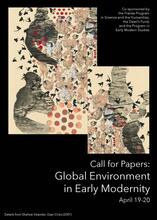Climate change and its shifting modes of representation—in news media, contemporary literature, or heavy-handed Hollywood blockbusters—involve problems of perspective and scale, the reliability and verifiability of science, and, at times, a certain funereal nostalgia for a mythologized golden age of harmony between humans and nature. But these problems are nothing new. Robert Watson’s Back to Nature (2006) locates the origin of such contemporary issues in late Renaissance epistemological anxieties of representation, truth, and the constitution of “the world” in close connection with artistic imagings of the environment across media.
In more recent years, early modernists have grown increasingly focused on the ways in which global approaches to material, intellectual, literary, scientific, art, and music histories can illuminate the shortcomings of conventional understandings of the period and its modes of cultural production that are grounded primarily in Western theoretical and methodological frameworks. In a period deeply concerned with problems of perspectival representation—when “subjectivity” and “objectivity” carried meanings opposite their current ones—the early modern “world” and its “environment” are fraught, highly contingent figures enmeshed in logics of imperial expansion and the marginalization of alterity. It is thus incumbent upon current students of the period to engage with the complex points of interaction between Western and non-Western contexts of economic, cultural, and intellectual productivity as means of world-making and understanding the position of “the human” in the broader context of its environment.
We invite papers for a symposium to be held at Yale University on April 19-20, 2024. Papers can deal with the thematics outlined in this introduction from a variety of disciplinary approaches, and we especially welcome presentations that illuminate historically marginalized and understudied objects, texts, and contexts. Possible paper topics might touch upon one or more of the following:
-material histories, comparative paleography as indexes of environmental thinking
-historical scientific modes of understanding and relating to environment
-comparative global philosophies of experience, ethics, epistemology, ontology
-global lyric, the comparative grammar of subjectivity as a form of world-making
-art and architectural histories, histories of craft, visual cultures
-histories of performance, religious and ritual practices connected to environment
Please submit an abstract of no more than 250 words to john.hoffmeyer@yale.edu and taylor.kang@yale.edu. The deadline for abstracts is February 27, 2024.
